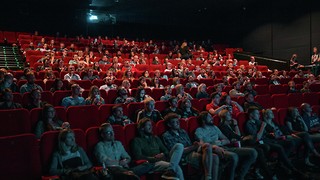Cataracts, hurricanoes and… chutzpah?
Despite a celebrated career as one of the nation’s greatest Shakespearean thesps, Simon Russell Beale tells Lauren Cooney that acting wasn’t always his strong point.
Simon Russell Beale tells me that his trouble is that he is “rather passive”. Fair play, given that we are both settled comfy in armchairs, smoking cigarettes and drinking tea. He wins superficial brownie points for being über relaxed. But this ‘passive’ doesn’t really stick. Not least because we are sitting in his rather slick Pimlico flat (which he apologises for, bemoaning his lack of a Hollywood salary), but mainly because he uses the word ‘chutzpah’ in relation to his career so many times, I keep expecting my cup of tea to be topped up with chicken soup.
Beale knows what he wants and knows what he likes, he is expressive and hilarious. In his career so far he has avoided film because he is constantly offered parts for “gay, overweight, Oxford-educated, middle-class boys”, and convincingly argues, “I can do that or I can play Richard III.” He muses that Philip Seymour Hoffman has a monopoly over the roles he’d have liked to have played, and enthuses that perhaps one day long-time friend Sam Mendes will make a film that isn’t set in suburban America. In the meantime, he will stick with his lengthy résumé of Shakespearean and Chekhovian protagonists; unless someone offers him a delicious piece of New Writing (“well-God-yes-please”).
He is now a household name in contemporary British theatre; my supervisor holds him up as our finest working actor. However, his plethora of impressive parts actually sprang from a more inauspicious background. He attended Gonville and Caius during the same era that Stephen Fry and co. were making waves, but definitely was not part of their Footlights crowd. He remembers being rejected from an audition by Hugh Laurie, but took it all in his stride: “I realised I was crap. I was a very bad actor.” Instead he sang in Trinity chamber choir and was a choral scholar at Caius. Nightly evensong commitments do not exactly sit well with Cambridge’s intensive rehearsal schedules. After his degree Beale went to Guildhall to train as an opera singer.
Perhaps his portly frame and sturdy vocal chords would have lent themselves to belting out operas forevermore had his ‘chutzpah’ not intervened. “Halfway through the year at Guildhall, I asked whether they would audition me for the acting course… it was unheard of.” He believes that his audacity won him the place. His audition speeches were “rather terrible”. Not content with training at one of London’s top drama schools, when an old Cambridge friend and director, Steve Unwin offered him a part at Edinburgh’s Traverse Theatre, he upped and left once more. He claims that his big break occurred later by telling a director “this role is me” in an audition. Cue fag break, sip of tea, and chortle of “yes, chutzpah again”.
Unusually for his time, Beale stayed with the Royal Shakespeare Company (RSC) for eight years. The company kept him interested, offering him a succession of meaty roles. This didn’t stop him being wary of accepting when new hotshot Mendes asked him to play Thersites in his debut RSC production of Troilus and Cressida, not wishing to play another Shakespearean clown. Luckily he was won over and he rates his working relationship with Mendes as one of his most valued. He still thinks of Troilus and Cressida as one of Mendes’ most successful productions: “it was soooo cool - all pale colours, cynical and sophisticated. There was no waving to mummy”.
Beale is aware of the directors that have inspired him, and of those directors and writers he would like to work with in the future. “Most actors I know want to be directed. It’s about wanting to learn something new… the most terrifying thing would be to be considered a big stage star and not to be directed”. As an actor he places great importance on directors being able to reassure him about the work, and admits to recently calling up Nick Hytner and making him promise that their upcoming show together will be funny. Having toured with Mendes’ Anglo-American Bridge Project, performing The Winter’s Tale and The Cherry Orchard in repertory, he found little discrepancy between the English and American actors’ training and ability, except that American actors are more private about the development of their characters. British actors will “ask other people, ‘Well, why did you do that?’”
This questioning stems from Beale’s desire to learn. He marks that his unsuccessful career in Cambridge drama was because “nobody taught me what it was about, how to do it really”. He is grateful to Steve Unwin who took him in hand, and did “just absolute clarity, simplicity, and listening”. Considering how many emotionally charged roles he has played, he has developed a technique for understanding characters that stems from Unwin’s teachings: “don’t worry at all about the emotional state of the character, until you have worked out exactly what they are saying, then you’ll find an emotional state that you don’t expect or preconceive”. Beale’s method takes him straight to the text. He uses his interpretation of Cassius in Julius Caesar to explain: when preparing for the role he found that Cassius threatens to commit suicide in every scene that he is in. This turns the preconceived image of Cassius as a “cool, cold, calculating, political operator” into a “passionate man - if you play it so that he really means [suicide] every time”. Looking out for such repetitions and ideas has helped prevent him from “washing a character with what you know”.
Then the doorbell rings, and his brother – an opera singer turned wine-seller – comes to have dinner with him. Chivalrously, he walks me back to the tube station, and we briefly discuss what he might do next. He yearns to do something site-specific but his ‘passive’ tendencies have so far intervened. Unexpectedly, the Shakespeare part that he currently hankers for most is Cleopatra. Aside from that, he tells me that (after firm assurance that he will be right for it) he is going to be playing King Lear at the National, directed by Mendes in 2012. And just as I was thinking that he was getting predictable, he follows this up with “well, we’ll be bombed anyway”: looks like his chutzpah hasn’t left him just yet.
 News / Tompkins Table 2025: Trinity widens gap on Christ’s19 August 2025
News / Tompkins Table 2025: Trinity widens gap on Christ’s19 August 2025 Comment / A plague on your new-build houses18 August 2025
Comment / A plague on your new-build houses18 August 2025 News / Pro-Palestine activists spray-paint Barclays Eagle Labs18 August 2025
News / Pro-Palestine activists spray-paint Barclays Eagle Labs18 August 2025 News / Pro-Palestine activists urge new Chancellor to ‘condemn Israel’20 August 2025
News / Pro-Palestine activists urge new Chancellor to ‘condemn Israel’20 August 2025 News / Trinity sells O2 Arena lease for £90m12 August 2025
News / Trinity sells O2 Arena lease for £90m12 August 2025









